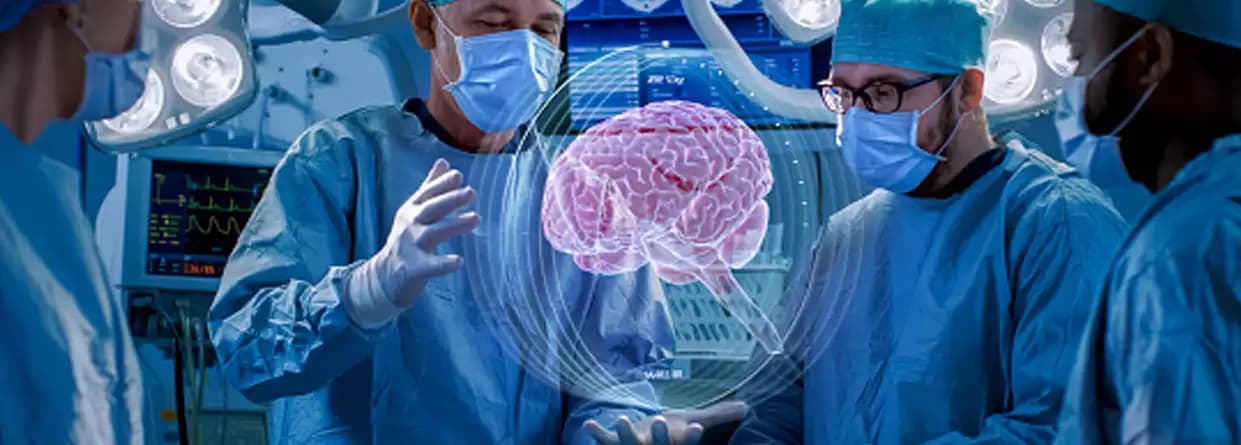
For patients with a brain tumour, surgery is one of the most common treatments.
For patients with a brain tumour, surgery is one of the most common treatments. Depending on the size and position of a tumour, the operation is performed by highly specialised surgeons. When a tumour is in a place that is difficult to reach or if the risk of damaging the vital parts of the brain is high with surgery, the tumour is called inoperable. In such an event, the doctor will recommend other treatments.
Surgery is the process of removing a tumour and its surrounding tissue. Especially for low-grade brain tumours and those that can be removed without causing damage, this is the only treatment required. Performed by a neurosurgeon, brain tumour surgery can help in improving neurological symptoms, improve the patient’s prognosis, and provide tissue for diagnosis.
Different types of surgeries and techniques are practised. A patient’s individual circumstances and history will determine the kind of approach taken by doctors.
Brain surgery is performed for the following reasons -:
Many non-cancerous tumours are treated only with surgery. However, the majority of cancerous ones will require treatment in addition to surgery, such as chemotherapy, radiation therapy, etc.
While brain surgery is a serious procedure, it is quite safe and is only carried out by highly skilled doctors. Even if the entire tumour cannot be removed, the neurosurgeon will try to remove as much as possible to slow its growth and curtail symptoms.
There are two primary types of brain tumour surgery – Craniotomy and neuro endoscopy.
This is the most common type of brain tumour surgery, where the patient is given a general anaesthetic and is asleep. In this procedure, the neurosurgeon cuts out some area of bone from the skull, using the opening to operate on the brain. In preparation for the surgery, a portion of the scalp is typically shaved. When the outermost layer of the brain tissue is exposed, the tumour is located and removed. Then, the scalp is stitched back shut. Since a part of the cranium is removed, this surgery is called a craniotomy.
In a neuro endoscopy, all or part of a tumour in the fluid-filled areas of the brain is removed. The procedure uses an endoscope, an instrument shaped like a long tube that has a camera attached to a monitor and an eyepiece. A small hole is made into the skull, through which the endoscope is inserted. With the eyepiece, the surgeon can see what lies at the tip of the endoscope. There are tiny forceps and scissors at the end, using which the surgeon removes the tumour.
Brain surgery, much like any other invasive procedure, comes with a few risks despite the advances medical science has made in safety and precision. Some complications that can arise after surgery are –
Before an actual surgery is carried out, doctors perform a series of assessments to test the patient’s suitability and fitness for brain surgery. Several tests are done – blood tests to check for hormonal imbalance, an electro-echocardiogram to check heart function, X-rays, MRI scans, etc. Typically, these assessments happen over 1-3 weeks before the surgery. Only after this happens do doctors decide which procedure is most suitable for the patient.
Doctors will also discuss drug and food allergies to decide on the diet and post-operative medication. During such consultations, the patient’s medical history and family history are taken into account.
Some patients have also been prescribed steroids before the surgery to help reduce the swelling caused by the tumour.
Recovery from brain surgery can take a couple of months, sometimes even more. The team performing the surgery typically creates a recovery plan. Usually, after the procedure, a patient is kept in the hospital for a few days, during which doctors monitor overall patient health and risk of complications.
Some patients have drips and tubes in place when they wake up; these are for providing fluid and drugs to the body or draining them out. Some patients have a headache upon waking up from the operation, which is treatable with painkillers.
After surgery, some lifestyle changes are in order – less stress, reduced alcohol intake, frequent check-ups to monitor symptoms, etc. Because brain surgery causes exhaustion in the patient, it is crucial for the body to get adequate rest.
Written and Verified by:

Dr. Anjani Kumar Sharma is the Director of Neurosciences Dept. at CK Birla Hospital, Jaipur, bringing over 32 years of experience. He specializes in epilepsy, neuromuscular disorders, and stroke.
Similar Neurosciences Blogs
Book Your Appointment TODAY
© 2024 RBH Jaipur. All Rights Reserved.